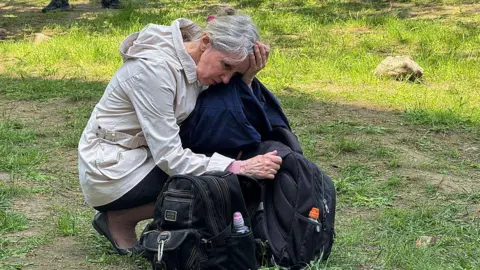**London to Host Fresh Russia-Ukraine Ceasefire Talks**
In a notable diplomatic move, London is set to host renewed talks aimed at negotiating a ceasefire in the protracted conflict between Russia and Ukraine. Scheduled for Wednesday, these discussions will involve diplomats from key nations including the United Kingdom, France, Germany, Ukraine, and the United States, who are all intent on bringing an end to the three-year war that has claimed countless lives and displaced millions.
The backdrop to these talks is marked by a burgeoning speculation that Russia may be considering halting its aggressive advances along established front lines. In exchange, the nation could seek substantial concessions from its adversaries. Although the frequency of diplomatic engagements has intensified recently, uncertainty remains regarding the potential outcomes and probabilities of success from this renewed fervor for negotiations.
US diplomatic representation has shifted, as initially expected officials, including special envoy Steve Witkoff and Secretary of State Marco Rubio, withdrew from the delegation. They were subsequently replaced by General Keith Kellogg, Trump’s envoy to Ukraine, marking a significant change in American representation. This last-minute modification raises questions about the continuity of American foreign policy in the ongoing crisis.
On the evening prior to the talks, Secretary Rubio engaged in a conversation with UK Foreign Secretary David Lammy about what both leaders hoped would be “substantive and good technical meetings.” Lammy characterized the dialogue as “productive,” underscoring the pivotal moment it represents for Ukraine, Britain, and overall Euro-Atlantic security. Rubio expressed his intention to reschedule his trip to the UK in forthcoming months, indicating a commitment to follow up on these vital discussions.
At the same time, developments are unfolding in Moscow, where Witkoff is anticipated to meet with Russian President Vladimir Putin for the fourth time this week. Reports from sources such as the Financial Times suggest that Russia might be willing to pause its military operations along the current front lines in return for international acknowledgment of its claims over Crimea. However, Ukrainian President Volodymyr Zelensky has firmly rejected any proposals suggesting recognition of Crimea as part of Russia.
Despite Putin’s declaration of a temporary ceasefire over the recent Easter weekend, UK Defence Secretary John Healey has articulated concerns about ongoing hostilities. He informed the House of Commons that British military intelligence has seen no evidence to support claims of decreased Russian aggression. Healey remarked, “While Putin has said he declared an Easter truce, he broke it,” adding that there had been no commitment to a full ceasefire and criticizing Putin’s attempts to prolong negotiations while maintaining military pressure.
The war, which initiated on February 24, 2022, has resulted in staggering human costs, with hundreds of thousands killed or injured, and nearly seven million Ukrainians displaced as refugees around the globe. Furthermore, the roots of this conflict extend back to 2014, in the aftermath of Ukraine’s political upheaval that led to the ousting of a pro-Russian president, followed by Russia’s annexation of Crimea and continued military involvement in eastern Ukraine.
As this fresh round of ceasefire negotiations takes place amid ongoing violence, the world watches with bated breath, hopeful yet uncertain about the outcome of these diplomatic efforts. The complexity of the situation, with deep-seated historical grievances and geopolitical interests, suggests that the path to peace remains fraught with challenges and setbacks. The international community’s response and the willingness of Russia and Ukraine to compromise will ultimately define the direction of these dialogues and the broader prospects for lasting resolution.



